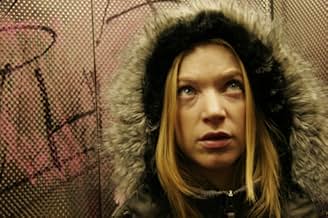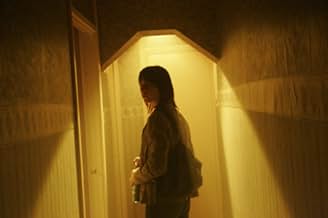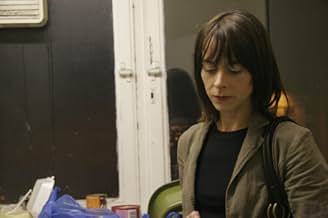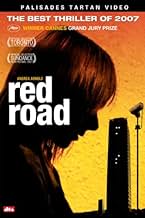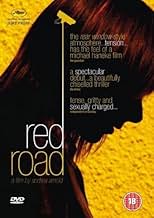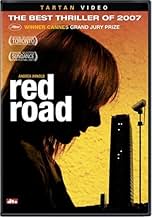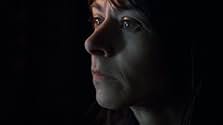AVALIAÇÃO DA IMDb
6,8/10
14 mil
SUA AVALIAÇÃO
Jackie trabalha como operadora dos circuitos de câmera de segurança. Certo dia um homem surge em seu monitor. Jackie acreditava que jamais o veria novamente e, sem escolha, é obrigada a conf... Ler tudoJackie trabalha como operadora dos circuitos de câmera de segurança. Certo dia um homem surge em seu monitor. Jackie acreditava que jamais o veria novamente e, sem escolha, é obrigada a confrontá-lo.Jackie trabalha como operadora dos circuitos de câmera de segurança. Certo dia um homem surge em seu monitor. Jackie acreditava que jamais o veria novamente e, sem escolha, é obrigada a confrontá-lo.
- Direção
- Roteiristas
- Artistas
- Ganhou 1 prêmio BAFTA
- 22 vitórias e 12 indicações no total
Cora Bissett
- Jo
- (as Cora Bisset)
- Direção
- Roteiristas
- Elenco e equipe completos
- Produção, bilheteria e muito mais no IMDbPro
Avaliações em destaque
I saw the trailer of this a few weeks ago and some of the mysterious and bleak nature of the shorts clips prompted that little voice inside me, saying " you won't be comfortable with it, but see it." I wasn't and I did.
The plot unravels slowly with little hints as to its central theme dotted about sensitively. It has you asking the question, what has happened to Jackie? How does this figure Clyde she has recognised and recoiled from on the CCTV monitors at work impacted on her lonely and monochrome life ? The answers come quite slowly as she puts her head into the lion's jaws of proximity to this danger man. A bit like the pantomime responses I felt like saying, " No, don't go any closer,he's behind you; you'll be recognised.", failing to recognise myself that something in her wants exactly that. In fact she receives from him perversely, what no viewer might possibly expect, but then she has us asking, is this payback time ? I'm not telling you, see the film ! The unfinished business Jackie has with Clyde is what this film is about.
The raw,down-at-heel, desperate, littered, high rise and windy Glasgow streets and housing estates as the backdrop. Ordinary everyday people get on with their lives oblivious of the drama being enacted in Jackie's life and culminating in an protracted showdown. But this is not the end. No, for all the unresolved grief, anger, erotic fascination and damaged lives, there remains a hope born of the unlikely. The film leads you away from the possibility, but ultimately there is life after death in Red Road. No cheering music soundtrack intrudes to romanticise what cannot possibly yield to only to the mawkish. There is just silence, sounds of the street, machinery, public transport and some well chosen tracks to create mood when required. This is what the vintage among us identify as continental cinema, no wonder they loved it at Cannes. This is not a film for audiences to remain detached from; the sheer intimacy of the camera work and the evolving personal destinies involved get you involved too, uncomfortably. A home grown vignette of humanity wrestling with the s..t that regularly happens !
The plot unravels slowly with little hints as to its central theme dotted about sensitively. It has you asking the question, what has happened to Jackie? How does this figure Clyde she has recognised and recoiled from on the CCTV monitors at work impacted on her lonely and monochrome life ? The answers come quite slowly as she puts her head into the lion's jaws of proximity to this danger man. A bit like the pantomime responses I felt like saying, " No, don't go any closer,he's behind you; you'll be recognised.", failing to recognise myself that something in her wants exactly that. In fact she receives from him perversely, what no viewer might possibly expect, but then she has us asking, is this payback time ? I'm not telling you, see the film ! The unfinished business Jackie has with Clyde is what this film is about.
The raw,down-at-heel, desperate, littered, high rise and windy Glasgow streets and housing estates as the backdrop. Ordinary everyday people get on with their lives oblivious of the drama being enacted in Jackie's life and culminating in an protracted showdown. But this is not the end. No, for all the unresolved grief, anger, erotic fascination and damaged lives, there remains a hope born of the unlikely. The film leads you away from the possibility, but ultimately there is life after death in Red Road. No cheering music soundtrack intrudes to romanticise what cannot possibly yield to only to the mawkish. There is just silence, sounds of the street, machinery, public transport and some well chosen tracks to create mood when required. This is what the vintage among us identify as continental cinema, no wonder they loved it at Cannes. This is not a film for audiences to remain detached from; the sheer intimacy of the camera work and the evolving personal destinies involved get you involved too, uncomfortably. A home grown vignette of humanity wrestling with the s..t that regularly happens !
I saw "Red Road" at Cannes, and it was my pick as best film almost to the end, beaten out only by "Pan's Labyrinth". The film keeps you off balance throughout because you are not told what to think of events; they simply unfold without explanation until the events themselves necessitate dialogue between the two main characters. Not knowing becomes rather vexing because you are always trying to figure out why the protagonist does so much that you feel is wrong, but it's all just part of the fun. And the kind of storytelling I enjoy most. It reminded me of "Exotica", another film I loved. Too, the faces of the actors are relatively unfamiliar which adds to the mystery, since they carry no "baggage" from previous films to the characters.
There doesn't seem to be a distributor connected to this movie yet, and we'd really lose out if it doesn't get to the U. S. To the reviewer who gave away the plot, you are an ass.
There doesn't seem to be a distributor connected to this movie yet, and we'd really lose out if it doesn't get to the U. S. To the reviewer who gave away the plot, you are an ass.
The slowly unravelling character and background of a CCTV operator form the plot of this gripping and unsettling, low-budget, yet very professionally made film. Jackie's job is to watch the feed from closed circuit cameras sited in the less desirable areas of Glasgow (including a street called Red Road), and liaising with the police where possible to help track or prevent crime. She's a dour Scots lass who gives little away, and we build up a picture of her life very efficiently in the first few varied and colourful short scenes - her working life, her social life, her sex life and (at the edge of it) her family life.
She starts to follow an ex-con who she recognises on the cameras, eventually ingratiating herself into his life. We are kept in the dark for a very long time as to her motives and simply feel an insidious, creeping tension as she takes risks. That we become so glued to what she is up to is a great credit to the skillful characterisation and acting. It's one of those films where, if you want to feel the full impact of the surprises, the less you know about the story the better. The title maybe also suggests a path of sexual tension and danger that the protagonist feels she has to follow. The final denouement brings a surprise emotional enlightenment. If you dislike independent film-making or are averse to explicit sex, avoid Red Road; otherwise make a bee-line to see one of the most original and capable films to come out of Scotland.
Delving into the world of CCTV also opens up other questions. Britain has a very high deployment of CCTV - according to one estimate, the average Briton is recorded by CCTV cameras 300 times a day (director Andrea Arnold says in an interview that twenty per cent of all the CCTV cameras in the world are in Britain) - and there are also concerns about privacy and abuse. The film doesn't argue for or against - it seems realistic - but in portraying 'a face that watches the footage' it allows us to picture what it is maybe like on the other side of the camera when we form our ideas about the social dilemmas.
Although Red Road has been roundly praised, it is not immediately clear why it is so successful. There is very little substantive action for a long time and little of the obvious attention grabbers such as violence or heavy romance. Although it seems to be directed on a very tight leash, part of the credit no doubt should also go to Lone Scherfig (characterisation is done in part by Scherfig as collaborator), and with whose background there is a discernible connection.
Danish Director Scherfig rose to fame with Italian for Beginners, one of the successful films to be made under the strict discipline of the austere Dogme95 rules. While Red Road uses little of the formal laws of the back-to-basics Dogme system, the lessons learnt are evident: a lack of intrusive background music, no superficial action or definable genre, and so on. The reliance is on the characters themselves, and in working in the development of the Red Road characters Scherfig's genius is shining through. We feel, just as we did in her Wilbur Wants to Kill Himself, that the people have just walked off the streets of Glasgow (or are still walking about on them). This style of realism is also discernible in the first British Dogme film, Gypo, released about the same time as Red Road, and together they form almost a new thread in British cinema. Whatever the reasons or antecedents, Red Road is a film of remarkable ingenuity aimed at an intelligent adult audience.
The background to the creation of Red Road is that it forms part of a project called Advance Party. Scherfig and her collaborator, in accordance with the experiment, presented the fully fledged characters to director Andrea Arnold who then wrote the plot around them. They have a life of their own instead of being altered to fit a storyline. The creative genius behind the idea, as with Dogme, is Lars von Trier. In the hands of Oscar-winning director Arnold, we again see art and new creative processes forcing their head through the much-abused medium of cinema.
She starts to follow an ex-con who she recognises on the cameras, eventually ingratiating herself into his life. We are kept in the dark for a very long time as to her motives and simply feel an insidious, creeping tension as she takes risks. That we become so glued to what she is up to is a great credit to the skillful characterisation and acting. It's one of those films where, if you want to feel the full impact of the surprises, the less you know about the story the better. The title maybe also suggests a path of sexual tension and danger that the protagonist feels she has to follow. The final denouement brings a surprise emotional enlightenment. If you dislike independent film-making or are averse to explicit sex, avoid Red Road; otherwise make a bee-line to see one of the most original and capable films to come out of Scotland.
Delving into the world of CCTV also opens up other questions. Britain has a very high deployment of CCTV - according to one estimate, the average Briton is recorded by CCTV cameras 300 times a day (director Andrea Arnold says in an interview that twenty per cent of all the CCTV cameras in the world are in Britain) - and there are also concerns about privacy and abuse. The film doesn't argue for or against - it seems realistic - but in portraying 'a face that watches the footage' it allows us to picture what it is maybe like on the other side of the camera when we form our ideas about the social dilemmas.
Although Red Road has been roundly praised, it is not immediately clear why it is so successful. There is very little substantive action for a long time and little of the obvious attention grabbers such as violence or heavy romance. Although it seems to be directed on a very tight leash, part of the credit no doubt should also go to Lone Scherfig (characterisation is done in part by Scherfig as collaborator), and with whose background there is a discernible connection.
Danish Director Scherfig rose to fame with Italian for Beginners, one of the successful films to be made under the strict discipline of the austere Dogme95 rules. While Red Road uses little of the formal laws of the back-to-basics Dogme system, the lessons learnt are evident: a lack of intrusive background music, no superficial action or definable genre, and so on. The reliance is on the characters themselves, and in working in the development of the Red Road characters Scherfig's genius is shining through. We feel, just as we did in her Wilbur Wants to Kill Himself, that the people have just walked off the streets of Glasgow (or are still walking about on them). This style of realism is also discernible in the first British Dogme film, Gypo, released about the same time as Red Road, and together they form almost a new thread in British cinema. Whatever the reasons or antecedents, Red Road is a film of remarkable ingenuity aimed at an intelligent adult audience.
The background to the creation of Red Road is that it forms part of a project called Advance Party. Scherfig and her collaborator, in accordance with the experiment, presented the fully fledged characters to director Andrea Arnold who then wrote the plot around them. They have a life of their own instead of being altered to fit a storyline. The creative genius behind the idea, as with Dogme, is Lars von Trier. In the hands of Oscar-winning director Arnold, we again see art and new creative processes forcing their head through the much-abused medium of cinema.
Produced in collaboration with Lars von Trier's production house Zentropa and based on characters created by Lone Scherfig and Anders Thomas Jensen, this debut feature by Oscar-winning Andrea Arnold is the first British feature filmed under the rigid Dogma-principles. I guess I'll never become a big fan of Dogma-style film-making, but I must admit, this was a well-structured and ultimately intriguing piece of film-making, if you can make it to the final half hour, when part of the story is resolved and some sorely needed background information is given.
We meet a woman (Kate Dickie) who works as a CCTV operator, obsessively observing the residents in a run-down housing estate in Glasgow. She seems obsessed by her work, compensating for her non-existent social life. Most of the story revolves around a dire housing estate, a huge 25-floor tower, on Red Road, from which the film got its title. On day, when she zooms in on a man having some back-alley sex with a young woman, she recognizes him and starts tracking his every move on camera, but in real life as well, even insinuating herself into his life, going to his apartment and even attending a party he's giving. Obviously, she has some shared experience from the past with this man. At first, it seems an ex-husband/boyfriend, but soon it becomes obvious he doesn't know her, apart from a vague recollection, "haven't I seen you somewhere before?" Who is he and foremost, what on earth could this woman possibly want from him? The film keeps you guessing till the very end. Perhaps a bit too long. For almost 90 minutes you keep wondering why the hell she goes through all this trouble meeting this mysterious fellow. Till then we're fishing in the dark.
The film is greatly bolstered by two extremely convincing performances. Kate Dickie commits herself to this role with such vigour, her every move comes off completely believable, despite her motivations are hard to understand, while Tony Curran's performance ranges from very frightening to even touching at times. It's interesting enough to keep watching, but only just, till the end, when the elements fall in place. The prominence of CCTV surveillance in the film and how far it has penetrated Britons everyday lives (and increasingly in other parts of the world as well), is quite revealing and disturbing as well. Since a large part of the film consists of CCTV-images and is strained by Dogma-rules in the first place, the images are not always pleasing for the eye. But some beautifully shot night scenes around Red Road-estate and the two powerhouse performances by the leads largely make up for some shortcomings in the film's narrative.
Camera Obscura --- 7/10
We meet a woman (Kate Dickie) who works as a CCTV operator, obsessively observing the residents in a run-down housing estate in Glasgow. She seems obsessed by her work, compensating for her non-existent social life. Most of the story revolves around a dire housing estate, a huge 25-floor tower, on Red Road, from which the film got its title. On day, when she zooms in on a man having some back-alley sex with a young woman, she recognizes him and starts tracking his every move on camera, but in real life as well, even insinuating herself into his life, going to his apartment and even attending a party he's giving. Obviously, she has some shared experience from the past with this man. At first, it seems an ex-husband/boyfriend, but soon it becomes obvious he doesn't know her, apart from a vague recollection, "haven't I seen you somewhere before?" Who is he and foremost, what on earth could this woman possibly want from him? The film keeps you guessing till the very end. Perhaps a bit too long. For almost 90 minutes you keep wondering why the hell she goes through all this trouble meeting this mysterious fellow. Till then we're fishing in the dark.
The film is greatly bolstered by two extremely convincing performances. Kate Dickie commits herself to this role with such vigour, her every move comes off completely believable, despite her motivations are hard to understand, while Tony Curran's performance ranges from very frightening to even touching at times. It's interesting enough to keep watching, but only just, till the end, when the elements fall in place. The prominence of CCTV surveillance in the film and how far it has penetrated Britons everyday lives (and increasingly in other parts of the world as well), is quite revealing and disturbing as well. Since a large part of the film consists of CCTV-images and is strained by Dogma-rules in the first place, the images are not always pleasing for the eye. But some beautifully shot night scenes around Red Road-estate and the two powerhouse performances by the leads largely make up for some shortcomings in the film's narrative.
Camera Obscura --- 7/10
This film tries to create an aura of mystery and fails. It ends up being predictable and ultimately disappointing. It builds itself up for a major payoff that ends up not being anywhere near as shocking as you are lead to anticipate. Clyde turns out to be yet another typical Glaswegian anti-hero who committed a crime he didn't mean to and Jackie is just another person who hasn't gotten over the pain of loss and goes out of her way to manipulate her position, both at work and in her 'entrapment' of Clyde. The film captures the 'dreach' or bleakness of Glasgow well and it definitely captures the nature of technology and the certain voyeurism that results from it more often than not. But ultimately, it is a very goody-two-shoes ending. The best parts of the film are the acting, cinematography which has a Dogma 95 quality and the editing but again, the script is a let down. It could be a story that happens ANYWHERE and it fails to explain why necessarily Glasgow. All together, I found this film to be too hyped up to bother.
Você sabia?
- CuriosidadesRed Road is the first of three films made at the behest of The Advance Party, a Danish project inspired by Lars von Trier, who challenged Arnold and two other new directors to create films with the same group of characters.
- Erros de gravaçãoThe video screens in the surveillance centre do not show the date and time, which would severely limit their usefulness as filmed evidence in real life. The date and time have clearly been disabled to avoid continuity errors in filming. The 'shadow' of the numbers is however visible.
- ConexõesFeatured in WatchMojo: Top 20 Incredible Movies by First-Time Directors (2021)
- Trilhas sonorasCha Cha Slide
(M. Thompson)
Performed by D.J. Casper
Published by Universal Music Publishing Ltd.
(c) 1999 Master recording used by kind permission of Imperial Records
Principais escolhas
Faça login para avaliar e ver a lista de recomendações personalizadas
- How long is Red Road?Fornecido pela Alexa
Detalhes
- Data de lançamento
- Países de origem
- Centrais de atendimento oficiais
- Idioma
- Também conhecido como
- Red Road
- Locações de filme
- Empresas de produção
- Consulte mais créditos da empresa na IMDbPro
Bilheteria
- Faturamento bruto nos EUA e Canadá
- US$ 154.892
- Fim de semana de estreia nos EUA e Canadá
- US$ 17.009
- 15 de abr. de 2007
- Faturamento bruto mundial
- US$ 1.128.345
- Tempo de duração1 hora 53 minutos
- Cor
- Mixagem de som
- Proporção
- 1.85 : 1
Contribua para esta página
Sugerir uma alteração ou adicionar conteúdo ausente








